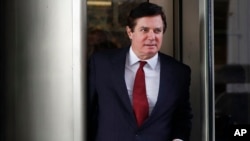The special counsel investigating Russian interference in the 2016 U.S. election escalated the pressure Friday on President Donald Trump's former campaign chairman Paul Manafort, bringing additional charges against him and a long-time associate for attempting to tamper with potential witnesses.
The new charges accuse Manafort, 69, and Konstantin Kilimnik, 48, of intentionally attempting to “corruptly persuade” two unidentified people “with intent to influence, delay, and prevent” their testimony. The contacts took place between February and April of this year.
They were both charged with conspiracy to obstruct justice and obstruction of justice. Manafort was already facing five other criminal charges in connection with his lobbying efforts on behalf of Ukraine's former government.
Kilimnik, who ran the Kyev office of Manafort's political consulting firm, becomes the 20th person indicted by special counsel Robert Mueller who is investigating whether Trump's campaign colluded with Russia to sway the outcome of the election.
The latest charges, issued by a federal grand jury, come after the special counsel said in court filings on Monday (June 4) that Manafort and an associate — now identified as Kilimnik — had "repeatedly" contacted two potential witnesses in an effort to sway their testimony.
Prosecutors said the two unidentified people worked with Manafort in organizing the so-called Hapsburg Group, an organization of former European officials enlisted to lobby EU officials and members of Congress on Ukraine’s behalf.
The two people told investigators that Manafort and Kilimnik had recently tried to get them to claim that the Hapsburg Group lobbying effort focused only on Europe.
In one message intercepted by investigators, Manafort wrote to one potential witness that “I have made it clear that they worked in Europe." In another intercepted message, Kilimnik told the second potential witness that “our friends never lobbied in the U.S.”
Mueller’s prosecutors then asked the federal judge presiding over Manafort's case in Washington to revoke or revise Manafort’s release conditions, which could potentially result in Manafort being jailed while he awaits trial.
Manafort is currently free on house arrest. He has pleaded not guilty to the charges contained in the previous two indictments.
In court papers filed late Friday, Manafort’s lawyers called the allegations of witness tampering “dubious,” saying the intercepted messages presented by Mueller back Manafort’s position that the “mission and work of the so-called Hapbsburg Group was European focused.”
Manafort is under indictment for, among other things, not registering as a foreign agent for lobbying on behalf of Ukraine. The other charges include conspiracy against the United States, conspiracy to launder money, and making false statements. If convicted of the charges, he could spend the rest of his life in prison.
The charges are not related to alleged collusion between Trump's campaign and Moscow being investigated by the special counsel.
Other former Trump associates indicted by the special counsel include Manafort’s former business associate and Trump campaign deputy chairman Rick Gates, Trump’s former National Security Adviser Michael Flynn and Trump campaign aide George Papadopoulos.
Kilimnik, who is suspected of having ties to Russian intelligence, headed the Kyev office of Davis Manafort Partners International, Manafort’s political consulting firm.
Kilimnik and Gates are accused of helping Manafort carry out a multi-million-dollar lobbying campaign on behalf of Ukraine's former pro-Russia prime minister Viktor Yanukovych, the Party of Regions and the government of Ukraine.
In February, Gates pleaded guilty to one count of conspiracy against the United States and one count of lying to the FBI, and is cooperating with the special counsel's investigation.




